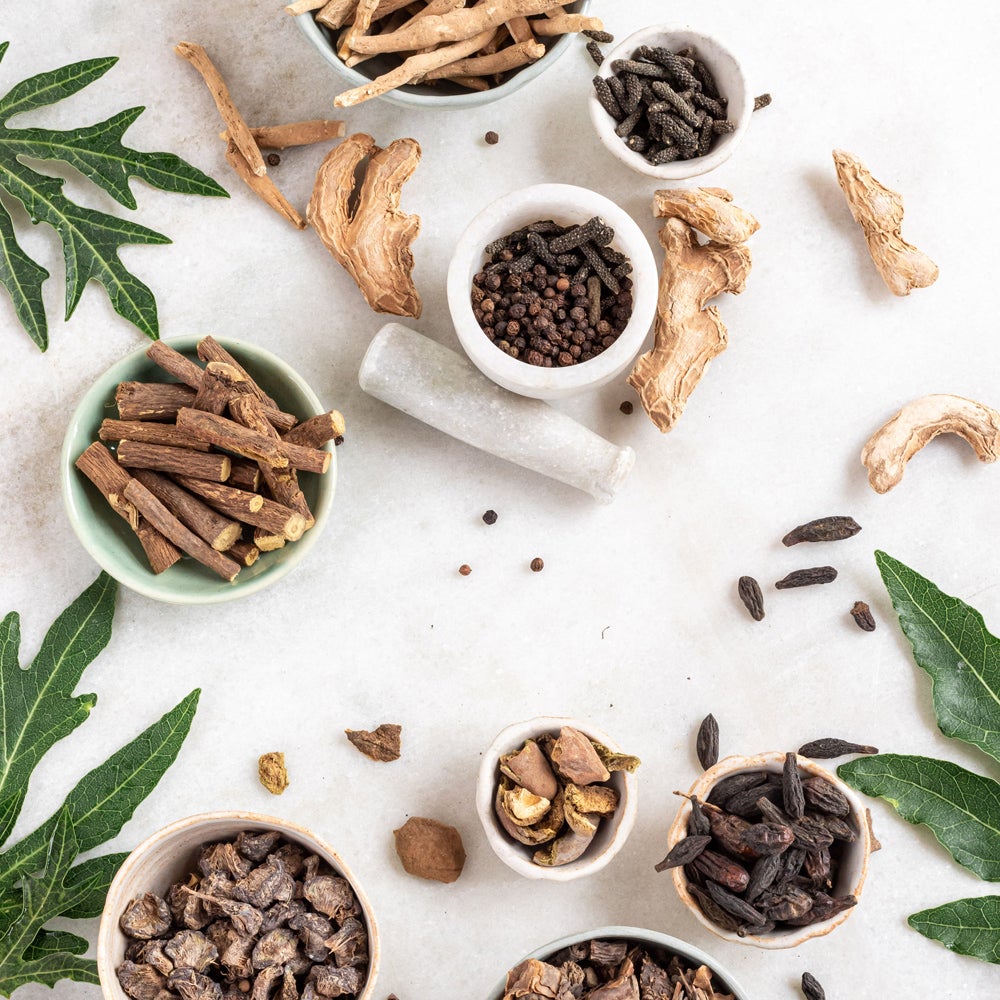
In our last blog, 'Decoding Immunity With Ayurveda', we discussed the concept of Immunity as per the science of life. In this blog, we'll take a closer look at the formulation of I-Immune, an Ayurvedic medicine that helps bolster the body’s natural defenses and boosts overall health.
THE DEVELOPMENT OF I-IMMUNE
The R&D team at BA did thorough research and came up with the formulation of I-IMMUNE, a polyherbal combination of Ayurvedic herbs, that has shown to be effective in multiple illnesses. The therapeutic activities of all the ingredients are supported and used with proven scientific studies.
ACTIONS OF I-IMMUNE INGREDIENTS:
- Immunity Enhancer Ingredients - Triphala, Mulethi, Haldi, Manjishtha, Ashwagandha, Papaya leaves, Trikatu, Guduchi.- Anti-Oxidant ingredients - Triphala, Mulethi, Haldi, Manjishtha, Ashwagandha, Wheatgrass, Moringa, Trikatu
- Antimicrobial Ingredients - Mulethi, Haldi, Manjishtha, Moringa, Papaya leaves, Trikatu
- Anti-Inflammatory Ingredients - Triphala, Mulethi, Haldi, Manjishtha, Ashwagandha, Moringa
- Hepato-Protective Ingredients - Triphala, Haldi, Manjishtha

DETAIL DESCRIPTION OF I-IMMUNE’S INGREDIENTS:
The phytochemicals (bioactive compounds) present in the herbs of I-IMMUNE are effective against the majority of illnesses. Take a close look at the herbs used in the development of I-ImmuneTRIPHALA: (An Ayurvedic herbal formulation made using equal parts of three herbs: Amalaki (Phyllanthus emblica), Bibhitaki (Terminalia bellirica), and Haritaki (Terminalia chebula).)
- It shows immunomodulatory properties and helps in improving the body’s defense system.
- Triphala's formulation is rich in antioxidants and is frequently used in Ayurvedic medicines to treat diseases such as anemia, jaundice, constipation, asthma, fever, and chronic ulcers.
- Triphala is also used as a laxative in chronic constipation and helps in colon cleansing, digestion problems, and poor food assimilation.
- The methanolic extract of Triphala shows good results in relieving inflammation and pain1
MULETHI: (Scientific Name : Glycyrrhiza glabra, Active compound : Glycyrrhizin or Glycyrrhizic acid )
- Rich in glycyrrhizic acid and glycyrrhetinic acid, Mulethi is known for its anti-inflammatory properties. A study reported steroid-like anti-inflammatory activity of constituents derived from licorice root 2.
- Mulethi is known for antiviral activity of glycyrrhizin and glycyrrhizic acid, where the compounds inhibit growth of hepatitis A and C.
- Mulethi is rich in antioxidants.
- Interestingly viruses are made up of two things, Protein & Nucleic acid. Mulethi contains glycyrrhizin bio-molecules that bind to the viral proteins hindering the entry of the virus into the respiratory system & protecting the lungs from viral infections.
HALDI (Scientific Name : Curcuma longa, Active compound : Curcumin)
- Curcumin (Polyphenolic compound) inhibits the STAT3 (Signal transducer and activator of transcription 3) and NF(Nuclear Factor)-κB signaling pathways, which play key roles in cancer development and progression4.
- Anti-inflammatory activity - Curcumin treatment inhibited the production of interleukin-8 (IL-8), macrophage inflammatory protein (MIP-1α), monocyte chemoattractant protein (MCP-1), interleukin-1β (IL-1β), and tumor necrosis factor (TNF-α). These compounds play a vital role in the production and development of inflammation.5
- Curcumin is a principal component of turmeric that helps treat respiratory illness, liver disorder, reduces inflammation, and acts as an antioxidant that prevents cell damage due to infection.
- Turmeric improves digestion & metabolism which results in enhanced production of hemoglobin.
MANJISHTHA: (Scientific Name : Rubia Cordifolia)
- Anti-inflammatory effect: Rubia cordifolia was evaluated for its anti-inflammatory activity and Rubia cordifolia for its analgesic activity. The study shows significant analgesic and anti-inflammatory activities. 6
- Hepatoprotective Activity: The hepatoprotective activity of an aqueous-methanol extract of Rubia cordifolia (Rubiaceae) was investigated against acetaminophen and CCl4 induced hepatic damage, confirming the hepatoprotective effects of the extract.
- Neuroprotective effect: The manjishtha extract has neuroprotective abilities and decreases neurodegeneration and helps in memory retention activity.
- Radioprotective Property: The alcoholic root extract protects against radiation-induced lipid peroxidation, hemopoietic injury, and genotoxicity.
- Antibacterial Activity: R. cordifolia is reported to have antibacterial properties that play an important role to help heal skin infections and improve skin health.7
- The hydro-alcoholic extract of Rubia cordifolia is Nephrotoxicity Protective.8
ASHWAGANDHA: (Scientific Name : Withania somnifera, Active compound : Withaferin-A and withanone (withanolides))
- Anti-Stress Agent: Ashwagandha is a potent anti-stress agent.
- Immunomodulatory activity: Administration of an extract from the powdered root of the plant, Withania somnifera, was found to stimulate immunological activity9.
- It has alkaloids that have anti-inflammatory properties that help reduce the swelling in the body.
WHEATGRASS: (Scientific Name : Triticum aestivum)
- Patients suffering from Covid-19 or any other infection are experiencing oxidative stress. Wheatgrass is rich in phenolic compounds and flavonoids that help decrease the cell damage caused by oxidative stress.
- Wheatgrass contains antioxidant and antiproliferative activity due to the presence of phenolics and flavonoids along with the nine different bioactive components10.
SIGRU/MORINGA: (Scientific Name : Moringa oleifera)
- Antioxidant activity: Aqueous and alcoholic extracts (methanolic & ethanolic) of the leaves and roots of Moringa oleifera exhibit strong antioxidant and radical scavenging activity. Its leaves are a rich source of antioxidant compounds and prevent oxidative damage caused by a high-fat diet11.
- Anti-inflammatory activity: Methanolic and aqueous extract of the root and the bark, methanolic extract of leaves and flowers, and ethanolic extract of seeds of Moringa oleifera possess anti-inflammatory activity.12
- Antimicrobial activity: Leaves, roots, bark, and seeds of Moringa oleifera show antimicrobial activity against bacteria and fungi. The fresh leaves and aqueous extract from the seeds inhibit the growth of Pseudomonas aeruginosa and staphylococcus aureus, the two most common causes of chronic wound infections13.
- Sigru leaves have 7 times more vitamin C than oranges, 10 times more Vitamin A than carrots, 17 times more calcium than milk, and 25 times more Iron than Spinach. These vitamins and nutrients help in the fast recovery of the body from infections.
- Sigru contains beta-carotene, a precursor of vitamin A, Vitamin B, Vitamin C, Vitamin D, E & rich in minerals like Calcium, potassium, Zinc, Magnesium, Iron & Copper.
PAPAYA LEAVES: (Scientific Name : Carica papaya)
- Antimicrobial Activity: C. papaya displayed antimicrobial, anti-amoebic, anti-parasitic, and anti-malaria actions. The use of C. papaya leaf water extract exhibit antimicrobial activity on the inhibition of some human pathogens, such as Escherichia coli, Pseudomonas aeruginosa, Klebsiella pneumoniae, Staphylococcus aureus, and Proteus mirabilis14.
- Immunomodulatory activity: C. papaya leaf extract showed immunomodulatory activity.15
- Antiulcerogenic actions were verified with the use of C. papaya seed water extract, the same action being observed using the methanolic extract, showing gastro-protective activity, in both prevention and treatment models of gastric ulcer16.
- Papaya leaf extract helps increase the total White Blood Cells. These WBCs engulf the viruses and produce antibodies. These antibodies bind to the virus particles and neutralize them, helping the body recover from infections.
TRIKATU: (A polyherbal formulation of pippali, sunthi, and marich whose botanical names are Piper longum Linn, Zingiber officinale, and Piper nigrum Linn)
- Trikatu contains 6-shogoal, 6-gingerol, and piperine bio-actives. That imparts antioxidant, analgesic, anti-inflammatory & anti-allergic activities.
- Hepatoprotective Activity: The ethanol extract of trikatu has hepatoprotective activity which has shown to lower serum levels of glutamic oxaloacetic transaminase, glutamic pyruvic transaminase, alkaline phosphatase, and total bilirubin.17.
- Immunomodulatory Activity: The immunomodulatory activity of the Trikatu has therapeutic potential for the prevention of autoimmune diseases18.
GUDUCHI: ( Scientific Name : Tinospora cordifolia)
- Immunomodulatory Activities: T. cordifolia is well known for its immunomodulatory response. A large variety of compounds that are responsible for immunomodulatory and cytotoxic effects are 11- hydroxymuskatone, N-methyl-2-pyrrolidone, Nformylannonain, cordifolioside A, magnoflorine, tinocordioside, and syringin.19
- Guduchi enhances the production of gastric juice and lysozymes. When the pathogen reaches the stomach, the highly acidic gastric juices destroy them.
- Guduchi stimulates the production of macrophage cells into the body that fights against viruses and pathogens. Likewise into the lungs macrophages fight against the Covid-19 virus.
Dosage Recommendations
I-Immune capsules can be taken twice a day with either lukewarm water or with milk. People taking antibiotics can also take I-Immune provided they take it after an interval of 1 hour. Avoid taking I-Immune capsules if you are already taking Giloy, Ashwagandha, or any other immunity-boosting Ayurvedic medicines.
Glossary:
- Immunomodulators: A substance that stimulates or suppresses the immune system and may help the body fight infection, cancer, or other diseases.↩
- Immunostimulators are prescribed to enhance the immune response against infectious diseases, tumors, primary or secondary immunodeficiency, and alterations in antibody transfer, among others. ↩
- Immunosuppressive drugs are used to reduce the immune response against transplanted organs and to treat autoimmune diseases such as pemphigus, lupus, or allergies.↩
- Hepatoprotective: A substance that can prevent damage to the liver.↩
- Anti-inflammatory drugs: A drug or substance that reduces inflammation (redness, swelling, and pain) in the body.↩
- Antioxidant: A substance that protects cells from the damage caused by free radicals (unstable molecules made by the process of oxidation during normal metabolism).↩
- Antimicrobial drugs: The substances that suppress the growth of, or destroy, micro-organisms including bacteria, fungi, helminths, protozoa, and viruses.↩
- Antiviral Drugs: These drugs are used to treat viral infections. They work by eliminating the virus or inhibiting its development (i.e. multiplication/ reproduction) in host cells.↩
- Antiproliferative – a drug/substance used to prevent or slow the spread of cells, especially malignant cells into surrounding tissues.↩
- In vitro - Tested on microorganisms↩
References:
*Jitendra Mittal, Madan Mohan Sharma, Amla Batra

Comments (0)
Back to News